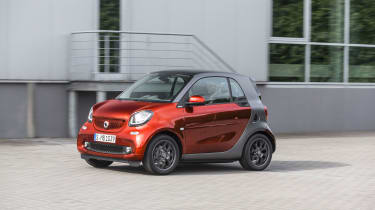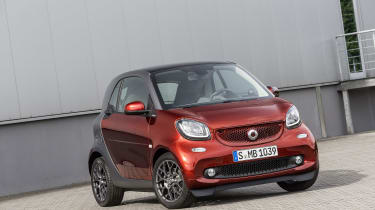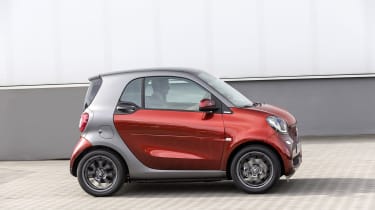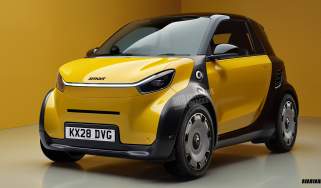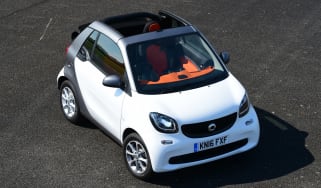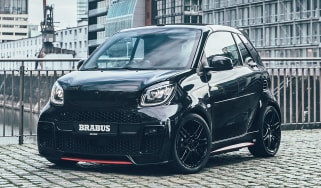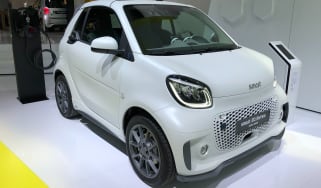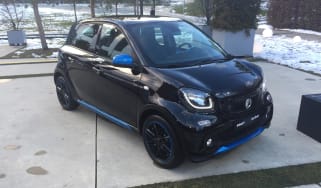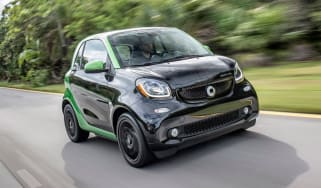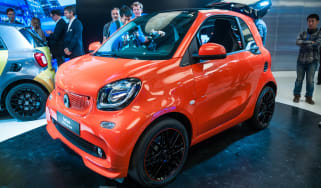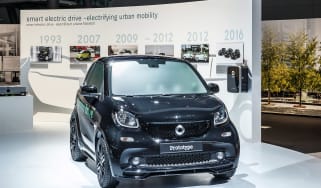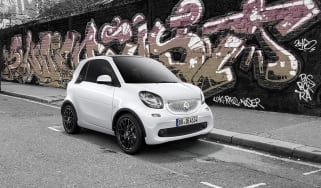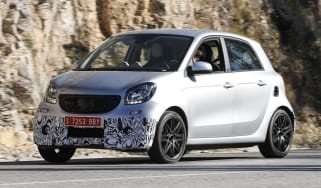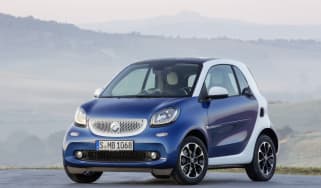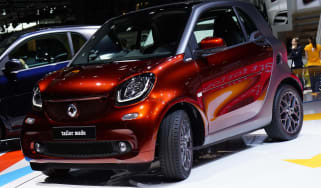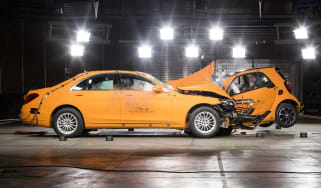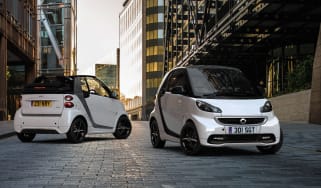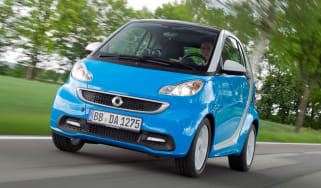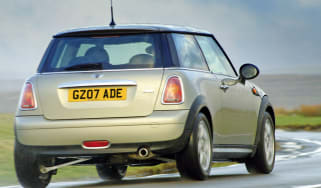Smart ForTwo review
The Smart ForTwo Mk3 is part of a tie-up with Renault, but delivers the same premium quality of its predecessors

There are very few cars that gain a cult following, but the Smart ForTwo is one of them. The two-seater city car has been around for nearly 20 years, and in that time its compact dimensions and rear-engined layout have marked it out as a unique proposition on the new car market.
The current version is the Mk3, and this time around it has spawned a larger model, in the form of the returning Smart ForFour. These two machines share most of their running gear - and the ForFour's bodyshell - with the Renault Twingo, but the Smart duo are marketed as higher end city cars with a higher quality interior and a price premium over the Renault.
• Best small cars on the market
The ForTwo sticks to the traditional Smart formula, with a short wheelbase and stumpy proportions, but the current car is far better to drive than its predecessors. There's a tight turning circle and peppy three-cylinder engines on offer, while Smart has much-improved its auto gearbox option, so it's now worth considering if you want a self-shifter.
The last ForTwo was at its best in ElectricDrive (ED) guise, as the direct-drive, single-speed gearbox eliminated any transmission issues. There is still an ED model available, but now the petrol model is worth considering again, thanks to its new powertrain.
Once again, the ForTwo is available with a hard or soft top, named Coupe and Cabrio respectively (the Cabrio has a £2,000 premium), while four trims are available across the range. The entry level Pure is pretty basic and can't be upgraded as much as other models, but it does bring the starting price of the ForTwo below £10k.
Used - available now

2022 Vauxhall
Crossland
23,736 milesManualPetrol1.2L
Cash £13,995
2022 Kia
Sportage
19,817 milesAutomaticDiesel1.6L
Cash £24,500
2021 Volvo
XC40
71,870 milesManualPetrol1.5L
Cash £17,800
2020 Nissan
Qashqai
35,084 milesAutomaticPetrol1.3L
Cash £14,700Next up is Passion spec and then Prime and Brabus models. In addition, the ForTwo ED electric models are standalone variants. In addition, there are Premium, Premium Plus, Sport and Sport Premium upgrade packages, as well as a host of colour, trim and spec upgrades available, while limited edition versions are available on a fairly regular basis.
Engines in the standard range are all three-cylinder petrols, with a non-turbo 1.0-litre version offering 71hp and a 900cc turbo in 90hp and 109hp Brabus guises. All come with a five-speed manual, while a six-speed auto is offered on the 90hp engine, and is standard on the 109hp. The Electric Drive models feature a 60kW electric motor and direct drive.
Rivals for the Smart ForTwo are varied thanks to its size and price range. In terms of city cars, most are cheaper, and rivals such as the Volkswagen up!, Skoda Citigo, SEAT Mii, Kia Picanto, Hyundai i10, Citroen C1, Peugeot 108 and Toyota Aygo all offer four seats and nearly as much personalisation as the Smart. Of course, there's also the four-seat ForFour to consider, which has a premium of £500 over the two-seater.
Looking at the ForTwo from a price perspective, which range from £10k to £22k for the engine-powered models, and cars like the Fiat 500 and MINI, but not a lot else. The ED models are over £21k, which is reasonable for an electric car, although the limited space and shorter range count against it when compared to cars like the VW e-up!, Renault Zoe and Nissan Leaf.
Smart's dinky ForTwo has become a modern-day automotive icon that's recognisable around the world. Now in its third generation, it's more mature, more useable and safer than it's ever been, but hasn't lost too much of the spirit of the original.
What used to be a noisy and impractical car has now grown up, offering quieter and more powerful engines and reasonable comfort, but with the same incredible urban practicality and rock-bottom running costs. Those looking for four seats can also try the similarly designed but more spacious ForFour.
While it still makes a powerful style statement, the new Smart has perhaps lost a little of the stand-out originality that attracted owners to earlier versions – while the joint-venture development programme with the Renault Twingo is evident from the driving seat, too. It's not particularly cheap, either, with a raft of four or five-seat city cars available for less.
Engines, performance and drive
Huge developments beneath the surface make the ForTwo Mk3 more engaging but still comfortable to drive. Smart has successfully addressed the two biggest issues with its city car: the ride and the refinement.
The latest chassis brings with it more sophisticated suspension – with some elements from the front axle being taken from the Mercedes C-Class compact executive saloon – so the ForTwo is no longer troubled by slightly worn tarmac. It’s more cushioned and compliant on the move, although still a way off the best superminis due to its short wheelbase.
The jerky and slow robotized manual gearbox, which plagued the old model, has now thankfully been ditched. In its place is a five-speed manual or optional (£995) six-speed dual-clutch auto. It's worth stumping up the extra cash for the auto as it makes this agile little city car even more lively and reactive ove the sticky five-speed manual version.
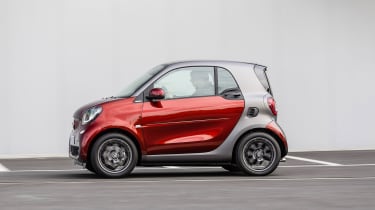
The engine now thrums rather than wheezes and the gearchange is far smoother. The 89bhp turbo engine commands a premium of around £700 over the 70bhp 1.0-litre motor, but we think it’s well worth the cash. It isn’t the most refined in its power delivery, but it’s far better suited to out of town driving, allowing you to keep up with faster-moving traffic.
The rear engine and rear-wheel drive setup has been employed to maximize practicality rather performance. Around the city it’s incredibly nimble and the 6.95m turning circle is the smallest of any car on sale. It’s a huge benefit when you have to navigate tight city streets or make impromptu u-turns on narrow roads.
Out of its comfort zone the ForTwo does still struggle. Rivals at this price point are far more capable on quicker roads and more comfortable. Wind noise is excessive due to the slab-sided body and the engine pulls almost 4,000rpm at 70mph. What’s more, on twistier roads, the weight over the rear axle results in alarmingly light steering, allowing very little confidence if you start to push on. The Skoda Citigo and Hyundai i10 are more fun to drive.
Go for the ForTwo Brabus, and it makes the most of the Smart's light weight. At 995kg, the 108bhp three-cylinder has less mass to push around, and shorter gearing and launch control, courtesy of the six-speed dual-clutch box, gave the Brabus a 0-60mph in 9.2 seconds on test. In-gear performance in fifth and sixth is strong, too.
However, despite the straight-line speed, the Brabus isn’t as fun to drive as the VW. The retuned steering is still very light, and the stiffer suspension combined with a short wheelbase means the Smart doesn’t feel as stable as the VW at speed.
It also doesn’t ride as well, being knocked off line by bumps that don’t upset the Renault or VW as much. It feels much stiffer, although there’s a good level of grip on offer. However, it’s difficult to sense just how much there is, as the light steering doesn’t weight up at all, which means you don’t have a great connection with the car. Enter a corner too quickly and it can feel a little unstable. The brittle ride isn’t the only black mark against the Brabus when it comes to refinement, either. It’s the noisiest on the move, as the road roar and wind whistle aroundthe door seals is very loud. It means the Smart isn’t very comfortable on longer journeys.
Around town that small turning circle andeasy, swift-shifting gearbox make urban driving particularly simple. However, it’s not really any better than its rivals in the city, and it loses out significantly when it comes to comfort out of it.
The ForTwo electric drive retains most of the standard car's habits but the immediate shove of the electric motor makes it even more fun to drive in town. It's much quieter and smoother than either of the petrol models, too. In the real world, a range of around 70 miles also looks achievable.
MPG, CO2 and Running Costs
Due to its diminutive dimensions, the Smart ForTwo should cost mere pennies to run. That said, it's perhaps not quite as economical as you might think, with no model returning more than 70mpg on the combined cycle.
An entry-level 70bhp non-turbo Smart will do 68.9mpg, with 94g/km CO2 emissions. Upgrade to the 89bhp car and fuel economy drops slightly to 67.3mpg, but emissions stay below 100g/km. The heavier cabriolets take another small hit, but if you want a drop-top Smart this shouldn't put you off.
Spec and automatic gearbox and you'll see no penalty when it comes to fuel economy, which will be a boon for city dwellers, most of whom will find the self-shifter much easier to drive around town.
The range-topping 108bhp auto-only Smart Brabus is not only the most expensive car to buy, but understandably also costs the most to run. The standard Brabus will return 62.8mpg, while the Cabrio posts a still-respectable 61.4mpg. No matter which Smart you go for, it's unlikely to break the bank.
The Smart Electric Drive isn't particularly cheap to buy, but it should only cost a couple of pounds to charge up, while there's no road tax to worry about. Electric cars (generally speaking) are less complex o should be moe simple to maintain.
Insurance groups
The Smart ForTwo is relatively cheap to insure, with the latest entry-level Pure model starting at group 4. The turbocharged car in mid-range Passion spec is group 8, while Cabrio Prime Sport Premium Plus with all the bells and whistles and an automatic gearbox is group 10. A Smart ForTwo Brabus is group 11.
Depreciation
Relatively low list prices mean the Smart ForTwo doesn't have far to fall, and as a result all models boast strong residual values. In fact, only the Brabus models retain less than 40 per cent of their initial value after three years or 36,000 miles.
The 70bhp Passion model will keep hold of around 48 per cent of its purchase price, while a Prime Sport version with the more powerful 89bhp engine should retain around 46 per cent of its value. Cabrios aren't quite as good, with most ranging between 42 and 45 per cent.
Interior, design and technology
Smart ditched the ‘one-box’ design of the previous ForTwo when developing the new model. The bonnet is higher and softer, with the added width allowing the wheels to be pushed out into the corners, widening the stance and giving better road holding.
The short overhangs contribute to a tiny 2.69m overall length. The split rear tailgate also allows you access the boot even if space behind the car is limited.
The contrasting body colour scheme remains a trademark feature on the ForTwo, with the ‘Tridion safety cell’ available in three different colours. Add in the options for the body panels and front grille, and buyers have 40 different colour combinations available. It’s just as colourful inside too, with bright fabrics on the dash and seats depending on spec.
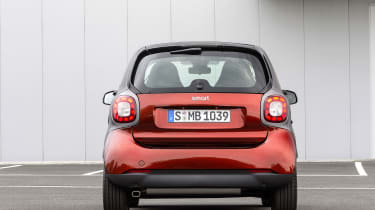
In the cabin, a new dash and centre console design are far more upmarket than before but there are still some cheap-looking plastics lurking around, and there are clear carry-overs from the related Renault Twingo. The dash-mounted rev counter feels and looks flimsy but the optional seven-inch floating sat-nav screen looks sharp and the menu system is easy to navigate.
As with the ForFour, three trim levels are offered named Passion, Prime and Proxy. Standard kit includes cruise control, climate control and 15-inch alloy wheels. The Electric Drive model is based on Prime spec, with a few bespoke features including the ability to pre-cool or pre-heat the car via a smartphone app.
Sat-nav, stereo and infotainment
If you want integrated sat-nav in the Smart, you’ll have to go for the £1,245 Premium equipment pack, which adds a seven-inch touchscreen identical to that in the Renault Twingo, albeit with a slightly different skin. Given DAB is an extra, it makes the Smart’s package look expensive at more than double the price.
As it shares its infotainment with the Twingo, there’s a similar level of functionality, with TomTom Live services included for three years, giving info on traffic. You also get Smart’s parking assistance system, but like its competitors, the car is so compact that this isn’t really necessary. There’s an upgraded JBL sound system to drown out road noise, while voice control also comes on top of the standard Bluetooth system for calls and audio streaming.
Smartphone connectivity isn’t great. The Smart gets MirrorLink, which only works with Android phones, but this isn’t nearly as sophisticated as Android Auto.
Practicality, comfort and boot space
An obvious drawback is that the Smart can only seat two people, while cheaper alternatives can seat up to five. But if space for two is enough, there are plenty of nifty features that increase the Smart’s appeal.
The doors are wide, making access easy and – thanks to the added 110mm in width – the car feels far more spacious inside than the exterior proportions would suggest.
There’s plenty of room for driver and passenger, but it will be worthwhile investing £295 in the Comfort Package which adds height adjustment for the driver’s seat and steering wheel. (The Comfort Package upgrades are thrown in automatically with the also-desirable Premium Package.)
Beneath the centre console hides another pull-out storage area, which makes up for the small glove box.
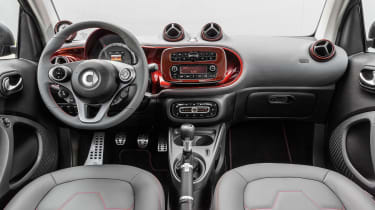
Size
Despite sharing much of its engineering and systems with the Renault Twingo, at 2,695mm the ForTwo is considerably shorter than its 3,595mm counterpart. The Toyota Aygo is a good bit longer too, at 3,455mm.
The 1,663mm tall ForTwo sits between the other two for width, but at 1,555m it’s taller than the 1,460mm Aygo and almost identical in height to the Twingo.
Leg room, head room & passenger space
If you want to carry more than one passenger in a Smart, you need the new ForFour model. The ForTwo’s front seats back straight onto the car’s luggage compartment. It’s a serious competitive disadvantage when even the most cramped city car rear seats tend to be used occasionally, but Smart has stuck to its guns to ensure the ForTwo stays small.
Boot
The 260-litre boot is a good size and it’s simple to load and unload items as there is no load lip. The ledge is a little high, but the lower section of the split tailgate features a hidden cubby, which is handy for storing smaller or more fragile items.
Reliability and Safety
Smart has invested a lot of time and money to ensure the compact ForTwo is as safe as possible. The new platform means the little car is almost as safe as a Mercedes C-Class in the unfortunate event of a head-on collision, the company says.
EuroNCAP didn’t make quite as generous an assessment when it crash-tested the ForTwo in 2014, suggesting the side-impact protection provided by the airbags was below par. With the lack of an emergency brake system also taken into account, the ForTwo only won four out of five stars – but Smart has since implemented an airbag revision to address EuroNCAP’s concern.
Tech systems such as lane departure warning, forward collision warning and crosswind assist are on the options list.
The previous Smart ForTwo had a strong reliability record, with one recall on the books that affected just 26 cars. As it’s designed mainly for urban use, the brakes and gearbox did have a tendency to wear out faster on the previous ForTwo than on cars covering a lot of motorway miles. It’s too early yet to say how the new car will perform in this regard, or indeed how it will compare to rival city runabouts.
Few will be sorry that the occasionally troubling automatic from the previous generation has been consigned to history, but against that the new Renault/Mercedes jointly-developed three-cylinder engines have yet to prove themselves in the long term.
Smart models don’t figure in our 2015 Driver Power survey, but any badge snobs feeling sniffy about the possible effects of the Renault/Mercedes collaboration should take note of the overall brand scores. When asked specifically about reliability, our survey respondents rated Renault 14th and Mercedes 26th...
Warranty
The old Smart ForTwo was lumbered with a pretty poor two-year warranty, so it was pleasing to see the third generation being introduced with three-year cover and unlimited mileage. But while Smart may have caught up with the industry standard, it still falls way short of the five-year/100,000-mile cover offered by Hyundai on the i10.
Servicing
Smart has introduced 12,500 mile – or annual - service intervals on the latest ForTwo, and also has fixed price schemes allowing you to spread the cost in monthly instalments.
Annual servicing will cost £15 per month (or £180 per year), for as long as you are in the agreement.
For an alternative review of the latest Smart ForTwo Hatchback visit our sister site carbuyer.co.uk

